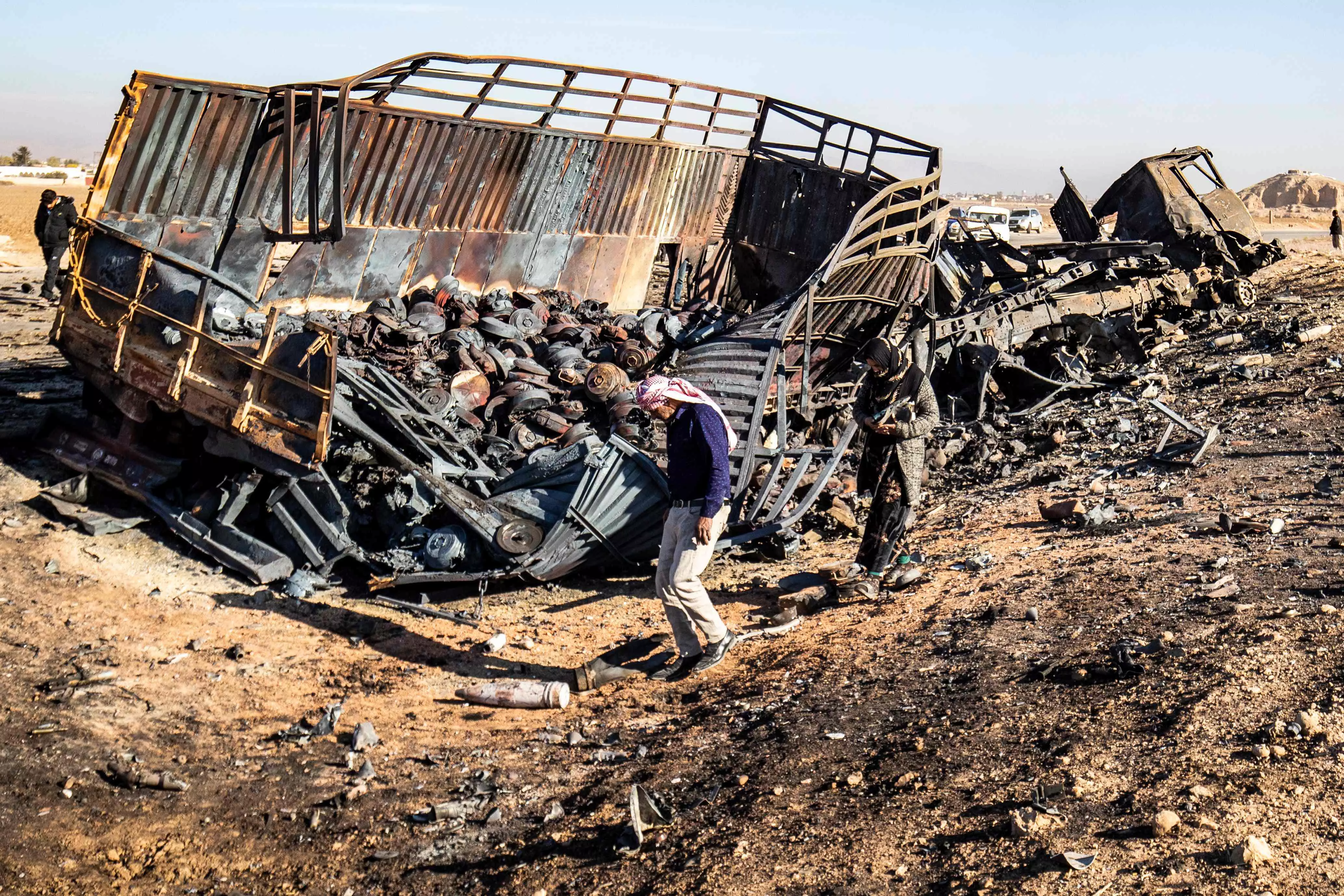What's next for Syria after Assad's fall?

Syrians look for metal pieces and unexploded ammunition at the site of the previous evening's Israeli airstrike that targeted shipments of weapons that belonged to Syrian government forces in Qamishli, in mainly Kurdish northeastern Syria, on December 10, 2024. The UN special envoy for Syria called on Israel on December 10 to halt its military movements and bombardments in Syria, after a war monitor reported 300 air strikes since the fall of President Bashar al-Assad. (Photo by Delil SOULEIMAN / AFP)
Beirut: The fall of Assad has put Syria at a crossroads, after nearly 14 years of civil war sparked by his deadly crackdown on democracy protests.
While Syrians around the country and in the diaspora were celebrating the ouster more than 50 years after Assad's father seized power, the country now faces enormous uncertainty.
What does the future hold for the country, and does it stand a chance at the democracy and peace so many Syrians have dreamt of?
Who are Syria's rebels?
Islamist group Hayat Tahrir al-Sham (HTS), which led the rebel offensive that ousted Assad, is rooted in Syria's branch of Al-Qaeda and comprises of a myriad factions.
Their stunning takeover will test their ability to remain united and mend ties with other groups, in a country that war has divided into fiefdoms ruled by rivals under varying degrees of foreign influence.
"There is the danger that armed groups will descend into fighting and rivalries," said Mona Yacoubian, vice president of the Middle East and North Africa Center at the US Institute of Peace.
While HTS's so-called Salvation Government has long controlled the Idlib region in northwest Syria, two border strips held by Turkish-backed factions have their own self-styled Syrian Interim Government.
In the southern Sweida and Daraa provinces, local fighters took control during the collapse of Assad's rule, while some of them have gone to Damascus, rebel sources told AFP.
The rebels, who have announced talks for the transfer of power, have taken over state media and the three-star flag of the opposition has been hoisted from several diplomatic outposts around the world.
But jihadism expert Aymenn Jawad Al-Tamimi said it was unclear "how exactly the central government will be organised considering you had two different administrative systems in insurgent-held zones in the northwest".
Beyond the rebel divisions, other groups are also vying for control of former government strongholds.
A semi-autonomous Kurdish administration controls the northeast.
Its de facto army, the US-backed Syrian Democratic Forces (SDF), moved into regions west of the Euphrates that the army abandoned.
"The country needs reunification under one authority or a federal system that perhaps grants autonomy to the SDF-held regions," Tamimi told AFP.
But it will be no easy task.
Turkey views the SDF's main component as an offshoot of a banned Kurdish group and has launched successive offensives to push the SDF from its border.
Turkish-backed fighters in recent days attacked Kurdish-held pockets in the north.
Concerns about sectarian violence have also surfaced, though HTS has sought to reassure religious minorities they will be safe in the new Syria.
What are the challenges?
Just two days after Assad's ouster, it is unclear whether HTS and its allies can consolidate power across Syria.
"Assad's fall provides an enormous opportunity for Syrians to realise their dream of establishing a multi-confessional democracy," said Yacoubian.
"But the road will be long and fraught with obstacles," she said, warning it was important "power vacuums are prevented and security is re-established".
This requires "local and national governance to consolidate in order to provide citizens with critical essential services", she said.
HTS's local government in Idlib "will be carbon-copied to the new 'Liberated Areas' as it consolidates its control," said Aaron Y. Zelin of the Washington Institute for Near East Policy.
As Syrians rejoice at the fall of a brutal government, human rights groups have warned that HTS too has a record of rights violations, which prompted protests earlier this year.
While HTS has promised to protect minorities from harm, it has not uttered a word on whether the Syrians will be able to elect their rulers.
Who are the new Syria's friends?
Assad was a pariah in the West and relied on support from Russia, Iran, and Lebanon's Hezbollah to stay in power.
But the rebels who ousted him are also outcasts.
According to the Syrian Observatory for Human Rights, Israel has launched more than 300 strikes on military positions in Syria since Assad's fall and sent troops into the buffer zone bordering Syria.
Yet there are some signs of a possible shift.
President Joe Biden has vowed to engage with all Syrian groups, though President-elect Donald Trump's views are still unclear.
According to Yacoubian, longtime Assad foe Turkey will likely be a key ally.
"Turkey will play an influential role in shaping the trajectory of the new Syria given its deep ties with several of the armed groups," she said.
Syria will likely move into "a different orbit with new allies emerging in the Sunni-dominated Gulf," she said.
Qatari officials are in contact with HTS, an official briefed on the developments said.
Wracked by war and poverty, Syria is in dire need of friends to fund reconstruction and kickstart its dying economy, reeling from Western sanctions.
"Significant financial assistance and reforms will be critical to resurrecting the Syrian economy," Yacoubian said.
( Source : AFP )
Next Story

